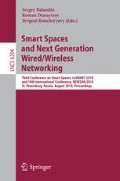Abstract
The problem of dynamic spectrum access in cognitive radio environments is addressed using a game theoretic approach. In order to investigate the relevance of certain equilibrium concepts for this problem, two oligopoly game models – Cournot and Stackelberg – are considered. For a more realistic formulation of the game, a modified rationality paradigm is considered. Within this paradigm agents may have approaches and biases towards different equilibrium concepts. We investigate the Pareto equilibrium and a new equilibrium concept – the joint Nash-Pareto equilibrium.
Access this chapter
Tax calculation will be finalised at checkout
Purchases are for personal use only
Preview
Unable to display preview. Download preview PDF.
References
Neel, J.O., Reed, J.H., Gilles, R.P.: Game Models for Cognitive Radio Algorithm Analysis (2004), http://www.mprg.org/people/gametheory/presentations.shtml
MacKenzie, A., Wicker, S.: Game Theory in Communications: Motivation, Explanation, and Application to Power Control. In: Globecom 2001, pp. 821–825 (2001)
Huang, J.W., Krishnamurthy, V.: Game Theoretic Issues in Cognitive Radio Systems. J. of Comm. 4(10), 790–802 (2009)
Dumitrescu, D., Lung, R.I., Mihoc, T.D.: Evolutionary Equilibria Detection in Non-Cooperative Games. In: Giacobini, M., Brabazon, A., Cagnoni, S., Di Caro, G.A., Ekárt, A., Esparcia-Alcázar, A.I., Farooq, M., Fink, A., Machado, P. (eds.) EvoStar 009. LNCS, vol. 5484, pp. 253–262. Springer, Heidelberg (2009)
Dumitrescu, D., Lung, R.I., Mihoc, T.D.: Generative relations for evolutionary equilibria detection. In: Genetic and Evolutionary Computation Conf GECCO ’09, pp. 1507–1512 (2009)
Osborne, M.J.: An Introduction to Game Theory. Oxford Univ. Press, Oxford (2004)
Maskery, M., Krishnamurthy, V., Zhao, Q.: Game Theoretic Learning and Pricing for Dynamic Spectrum Access in Cognitive Radio. In: Hossain, E., Bhargava, V.K. (eds.) Cognitive Wireless Communication Networks. Springer, New York (2007)
Popovski, P., Yomo, H., Prasad, R.: Strategies for Adaptive Frequency Hopping in the Unlicensed Bands. IEEE Wireless Communications, 60–67 (2006)
Cordeiro, C., Challapali, K., Birru, D.: IEEE 802.22: An Introduction to the First Wireless Standard based on Cognitive Radios. J. of Comm. 1(1), 38–47 (2006)
Srinivasa, S., Jafar, S.A.: The Throughput Potential of Cognitive Radio: A Theoretical Perspective. IEEE Communications Magazine, 73–79 (2007)
Niyato, D., Hossain, E.: Microeconomic Models for Dynamic Spectrum Management in Cognitive Radio Networks. In: Hossain, E., Bhargava, V.K. (eds.) Cognitive wireless communication networks. Springer, New York (2007)
Luise, M., Bacci, G.: A Noncooperative Approach to Joint Rate and Power Control for Infrastructure Wireless Networks. In: Proc. of ICST Int. Conf. on Game Theory for Networks, Istanbul, pp. 33–42 (2009)
Mitola, J.: Cognitive radio: An integrated agent architecture for software defined radio, PhD Dissertation Royal Inst. Technol. (KTH), Stockholm, Sweden (2000)
Deb, K., Agrawal, S., Pratab, A., Meyarivan, T.: A Fast Elitist Non-Dominated Sorting Genetic Algorithm for Multi-Objective Optimization: NSGA-II. In: Schoenauer, M., Deb, K., Rudolph, G., Yao, X., Lutton, E., Merelo, J.J., Schwefel, H.P. (eds.) PPSN 2000. LNCS, vol. 1917, pp. 849–858. Springer, Heidelberg (2000)
Author information
Authors and Affiliations
Editor information
Editors and Affiliations
Rights and permissions
Copyright information
© 2010 Springer-Verlag Berlin Heidelberg
About this paper
Cite this paper
Cremene, L., Dumitrescu, D., Nagy, R. (2010). Oligopoly Game Modeling for Cognitive Radio Environments. In: Balandin, S., Dunaytsev, R., Koucheryavy, Y. (eds) Smart Spaces and Next Generation Wired/Wireless Networking. ruSMART NEW2AN 2010 2010. Lecture Notes in Computer Science, vol 6294. Springer, Berlin, Heidelberg. https://doi.org/10.1007/978-3-642-14891-0_20
Download citation
DOI: https://doi.org/10.1007/978-3-642-14891-0_20
Publisher Name: Springer, Berlin, Heidelberg
Print ISBN: 978-3-642-14890-3
Online ISBN: 978-3-642-14891-0
eBook Packages: Computer ScienceComputer Science (R0)

